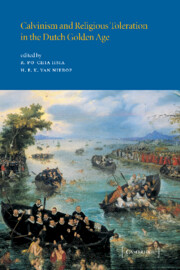Book contents
- Frontmatter
- Contents
- Notes on contributors
- 1 Introduction
- 2 ‘Dutch’ religious tolerance: celebration and revision
- 3 Religious toleration in the United Provinces: from ‘case’ to ‘model’
- 4 The bond of Christian piety: the individual practice of tolerance and intolerance in the Dutch Republic
- 5 Religious policies in the seventeenth-century Dutch Republic
- 6 Paying off the sheriff: strategies of Catholic toleration in Golden Age Holland
- 7 Sewing the bailiff in a blanket: Catholics and the law in Holland
- 8 Anabaptism and tolerance: possibilities and limitations
- 9 Jews and religious toleration in the Dutch Republic
- 10 Religious toleration and radical philosophy in the later Dutch Golden Age (1668–1710)
- 11 The politics of intolerance: citizenship and religion in the Dutch Republic (seventeenth to eighteenth centuries)
- Select bibliography
- Index
7 - Sewing the bailiff in a blanket: Catholics and the law in Holland
Published online by Cambridge University Press: 08 July 2009
- Frontmatter
- Contents
- Notes on contributors
- 1 Introduction
- 2 ‘Dutch’ religious tolerance: celebration and revision
- 3 Religious toleration in the United Provinces: from ‘case’ to ‘model’
- 4 The bond of Christian piety: the individual practice of tolerance and intolerance in the Dutch Republic
- 5 Religious policies in the seventeenth-century Dutch Republic
- 6 Paying off the sheriff: strategies of Catholic toleration in Golden Age Holland
- 7 Sewing the bailiff in a blanket: Catholics and the law in Holland
- 8 Anabaptism and tolerance: possibilities and limitations
- 9 Jews and religious toleration in the Dutch Republic
- 10 Religious toleration and radical philosophy in the later Dutch Golden Age (1668–1710)
- 11 The politics of intolerance: citizenship and religion in the Dutch Republic (seventeenth to eighteenth centuries)
- Select bibliography
- Index
Summary
In the summer of 1616 Baernt van Neck, bailiff (baljuw) of Texel, decided to crack down on the growing number of Papists on the island. For a long time the Catholics had organised clandestine meetings, in full daylight and in defiance of placards. But the bailiff's pursuit was unfortunate. When he tried to disrupt one of their gatherings, the Papists beat up his substitute – who was incidentally his brother-in-law – until he was ‘bloody and blue’ and kicked him unceremoniously out of their meeting. Nor was this all. They threatened the bailiff himself (despite his advanced age) with rakes, and ‘the women … tried to sew [him] in a blanket’.
Such a monstrous crime could not go unpunished. Yet instead of simply summoning the malefactors before his own court, the bailiff cited them before the Gecommitteerde raden van het Noorderkwartier, a body charged with the day-to-day administration of the northern part of the province of Holland, residing in Hoorn and consisting of representatives of the seven major cities of North Holland. The defendants contested the legality of this summons and appealed to the ancient privileges of the island, granting them the right to appear before a local court. On their behalf the magistrates of Texel sent a petition to the highest court of law of the province, the Hof van Holland in The Hague, to protest against this glaring and unprecedented infringement of Texel's privileges.
- Type
- Chapter
- Information
- Calvinism and Religious Toleration in the Dutch Golden Age , pp. 102 - 111Publisher: Cambridge University PressPrint publication year: 2002
- 2
- Cited by



